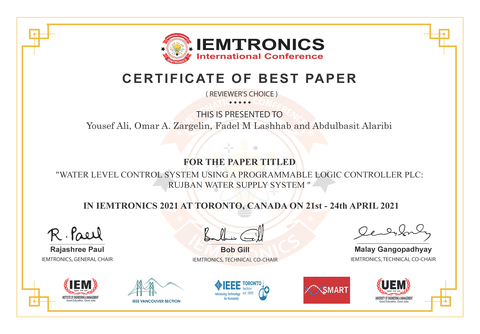Electrical Engineering Lecturer Fadel Lashhab Receives 2021 IEEE IEMTRONICS Best Paper Award

Electrical Engineering Lecturer Fadel Lashhab, Ph.D. recently received the 2021 Institute of Electrical and Electronics Engineers (IEEE), International IoT, Electronics and Mechatronics (IEMTRONICS) Best Paper Award in the Mobile Communication track for his paper titled "Water Level Control System Using a Programmable Logic Controller PLC: Rujban Water Supply System". IEEE IEMTRONICS is a multidisciplinary, international conference that aims to bring together scholars from different backgrounds to recognize current research in the fields of IoT, Electronics, and Mechatronics. Research paper submissions describing original works are invited in five tracks: IoT and Data Science, Electronics, Information Technology, Mobile Communication, and Mechatronics. The paper was co-authored by Abdulbasit Alaribi, Ph.D., Yousef Ali, Ph.D., and Omar A. Zargelin, Ph.D., researchers from Al Zintan University, Libya.
Dr. Lashhab and his team proposed an efficient, low-cost, flexible, economic, and easily configurable approach for water level control using a wireless solution. Considering that many countries in the Middle East and Africa suffer from water shortages due to insufficient and old water supply systems, the team researched creating automatic control based on PLC of the water supply system in Rujban, Libya. The water level control system combines two parts: wireless sensors and PLCs. Their research focus was on control system design for efficient automated water pumping through water level/water flow sensors, which turn on/off a specific number of pumps, and Siemens S7-200 PLC controller.
In this award-winning paper, Dr. Lashhab and his team provided details on their approach for the control system's main features, including the Siemens S7-200 PLC controller, water level/flow sensors, transmitter/receiver units, and auxiliary components. The overall procedure to convert the system from fully manual to fully automatic was also described in detail, as well as a simulation experiment using the PLC to control, manage, and evaluate the proposed control system. The experiment was successful in reducing energy consumption, eliminating water wastage, providing continuous water flow, protecting pump damage, maintaining the service life of the equipment, reducing the labor intensity of maintenance, avoiding disruptions in the water distribution system, and ensuring adequate supply for the city's daily water usage.
